"Main message of EU enlargement report conveys support for Ukraine, mild warning signs, and faith in our common future" - Interview of Katarína Mathernová, EU Ambassador to Ukraine, for UKRINFORM
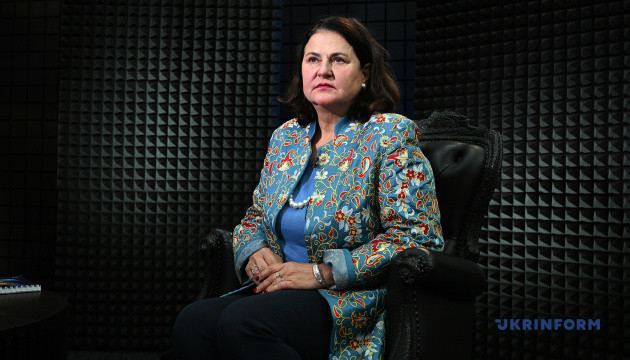
On Tuesday, November 4, the EU Ambassador to Ukraine, Katarina Mathernova, came over to an Ukrinform studio to comment on the annual EU enlargement report as regards Ukraine, published by the European Commission earlier that day. The voluminous document, hard to grasp for those not used to the bureaucratic lingo of officials in Brussels, is nevertheless a very important marker of the real state of play on Ukraine’s European integration path.
We asked the ambassador to share her own opinion on the tone of voice in the report, the positive and problematic issues highlighted in the document, and the main expectations for the upcoming year. Of course, we touched upon some other pressing issues, such as the reparation loan, Ukraine's participation in strengthening Europe's defense readiness, and the blocking of accession talks by the Hungarian authorities.
You can find out the diplomat’s views on this and other matters, including which financing option for Ukraine she would bet his own money on, what are the main messages the EU conveys to Ukraine with the latest enlargement report, and how is the European Union set to help Ukraine survive the winter, from this text version of the interview, as well as the full video available on Ukrinform’s YouTube channel.
THE REPORT IS WELL-DRAFTED AND WELL-BALANCED
- Another year has passed on our European integration path. And thank you, Madam Ambassador, that you're here with us today at Ukrinform to sum up this period and outline the main expectations for the next one. As they say in Brussels, the ink has not yet dried up on the document, and we're already here discussing it. It will take time to fully understand and read deeply into it and meanwhile we would be grateful if you could comment on its general, so to speak, temperature. In which areas does the EU seek to see Ukraine deliver the fastest transformations next year?
- First, thank you very much for the invitation. We have been spending long evenings and early mornings reading through the draft, and of course, my colleagues here in Kyiv very much contributed to the report and the assessment that took place here in Ukraine. And then it was sort of iterated between colleagues in Brussels with our input.
You are asking about the overall temperature, but let me just say that you are, we are now going to have a sad fourth anniversary of the full-scale invasion, we are in the fourth year of a brutal Russian invasion, and we are discussing progress on EU path of Ukraine.
Just sitting back, that is extraordinary that Ukraine, while fighting for national survival, sovereignty, and freedom is at the same time carrying out reforms.
I think that is remarkable, and the report acknowledges that. I think that in general, the report is, I would like to say, well-drafted and well-balanced. I think it gives credit where credit is due and comments on the very important progress that has been achieved. I'll give you just two examples of that. And also it puts criticism where criticism is needed. So I think it's a well-drafted, well-balanced report, and it shows the trend of progress that Ukraine has seen compared to last years’ reports.
In the areas of “good progress”, we had seven or six areas last year, and we have 12 areas this year. It's one of the matrices how much progress has been achieved. And the other matrix, the other comparison is level of preparedness. In last year’s report, there was a change in the level of preparedness in one chapter. In this year's report – it’s in seven chapters. So, really the trend is positive. It marks in the assessment very important improvement in the judgment on the fundamentals of the economy in Ukraine and its ability to withstand - this is the lingo we use – withstand the competitive pressures of the EU single market.
And then it also talks about areas which need to improve. I'm sure we will get into the discussion on rule of law and anti-corruption, but I'll leave that for later.
A lot of progress has been done, and it also very clearly identifies areas where further reforms need to be undertaken.
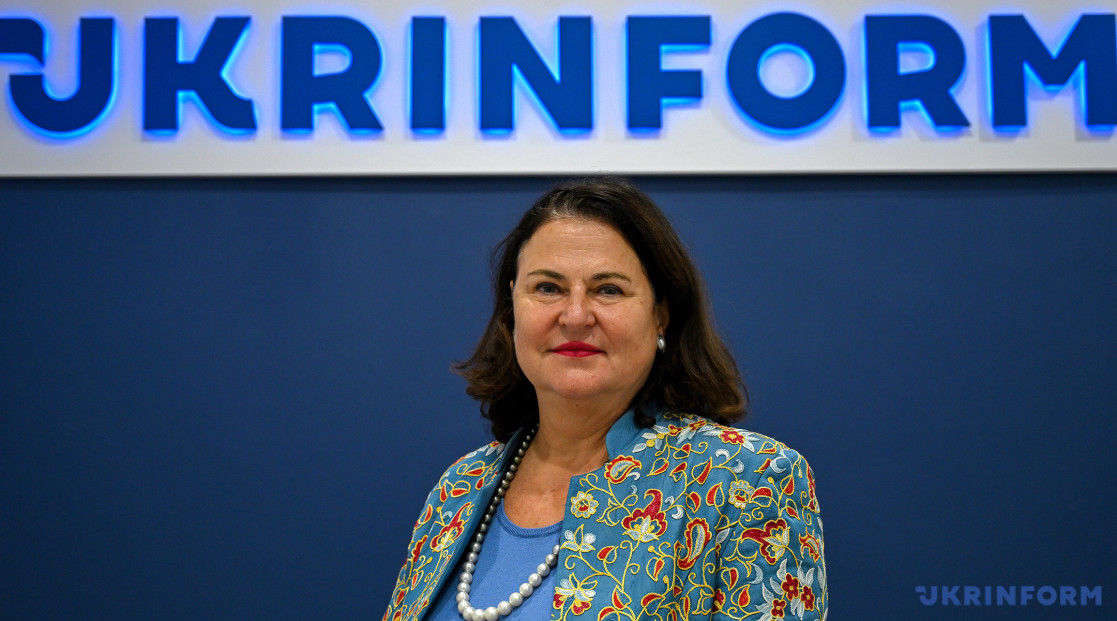
Ukrinform, 2025 (Yevhen Kotenko)
THE REPORT LAYS DOWN AN ASPIRATIONAL DATE FOR THE END OF TALKS
- By the way, today Commissioner Kos and HRVP Kallas highlighted that four aspiring countries as being particularly good in showing progress toward EU accession. How can you compare the situation of Ukraine with that of the other three countries?
- Look, I brought the Ukraine Report here with me. This is just our makeshift copy, but the cover is how it's going to look like when it's officially published in a nice version. That's just the Ukraine part. We also had what we call a chapeau communication, an overall report on all the countries. And then each country had its own individual, more detailed part. Indeed in the overall communication, four countries were identified as the frontrunners: Albania, Montenegro, Moldova, and Ukraine. And let me reiterate, none of the other countries is in a state of war. So, it's actually amazing that Ukraine keeps pace in reforming compared to countries that are not fighting a kinetic war although the hybrid warfare is, of course, present everywhere.
So these countries are the most advanced, and then there are other countries in different categories, including regress noted in the case of Georgia. And what is also important for the four countries is that this speaks about an aspirational date for the end of negotiations.
This is not a legal commitment, but it speaks about the expectation: that Montenegro will finish the preparation, their negotiations by the end of 2026, Albania - 2027, and Moldova and Ukraine - by the end of 2028.
UKRAINE NEEDS TO ENSURE THERE’S NO BACKSLIDING IN RULE OF LAW AND ANTI-GRAFT WORK
- Now let’s get into the specifics of this report regarding Ukraine. As you have mentioned, one of the areas that needs improvement in Ukraine is rule of law and anti-corruption efforts. This topic was in focus this summer when you yourself were really vocal and proactive, as well as your colleagues in Brussels, as well as people here in Ukraine, highlighting the need to preserve the pace of anti-corruption work. How do you assess the situation in this area today? And what in your opinion are the main tasks facing Ukraine in the next reporting period?
- The area of rule of law and anti-corruption is something that is evergreen with us. It's one of what we call fundamentals. So it's something that the European Union pays particular attention to, not only in Ukraine but across all the countries that that negotiate.
Indeed in July there was a law adopted that really seen as going contrary to what we have been discussing before, and there was a reaction of the public, there was a reaction internationally, and a corrective action was taken right away.
So what the report highlights now is what it highlighted also before, which is the need to continue building track records of investigations and prosecutions, and adjudications of corruption cases. And I think what we now put a particular emphasis on is the need to safeguard the independence of the anti-corruption architecture. I think that's emphasized in the report, and there is a particular chapter on that in terms of the rest of the judiciary.
We are in the process of finalizing judicial reform and there is a request that we will continue both with the buildup of the administrative justice system, with strengthening the High Anti-Corruption Court, resetting the Constitutional Court.
So, all these comments are similar to what was there last year, but reflecting on the improvements that have happened. And I think also in the overall communication, it says that Ukraine is very much on track, but it needs to ensure that there is no backsliding in the rule of law and anti-corruption area, and that we need to continue with these reforms.
- Another important area is national minorities. Earlier this autumn, when the enlargement commissioner came to Ukraine, she welcomed Ukraine's progress in working with and respecting the rights of national minorities. How would you comment on Ukraine's efforts in this regard?
- I was with Commissioner Kos in Uzhhorod where she started her three-day visit to Ukraine earlier this fall, and we had meetings, we visited two of the national minority schools – a Hungarian one and a Slovak one – and we also had a meeting with a full set of the National Minority Council with, I think, 28 representatives of the very diverse minority culture in Ukraine.
And the commissioner was a bit taken aback and very reassured by the fact that not a single representative from the Minority Council said anything against EU integration. On the contrary, they were very strongly expressing the view that it's very much in the interest of the national minorities for Ukraine to be part of the EU, and they were very strongly supportive.
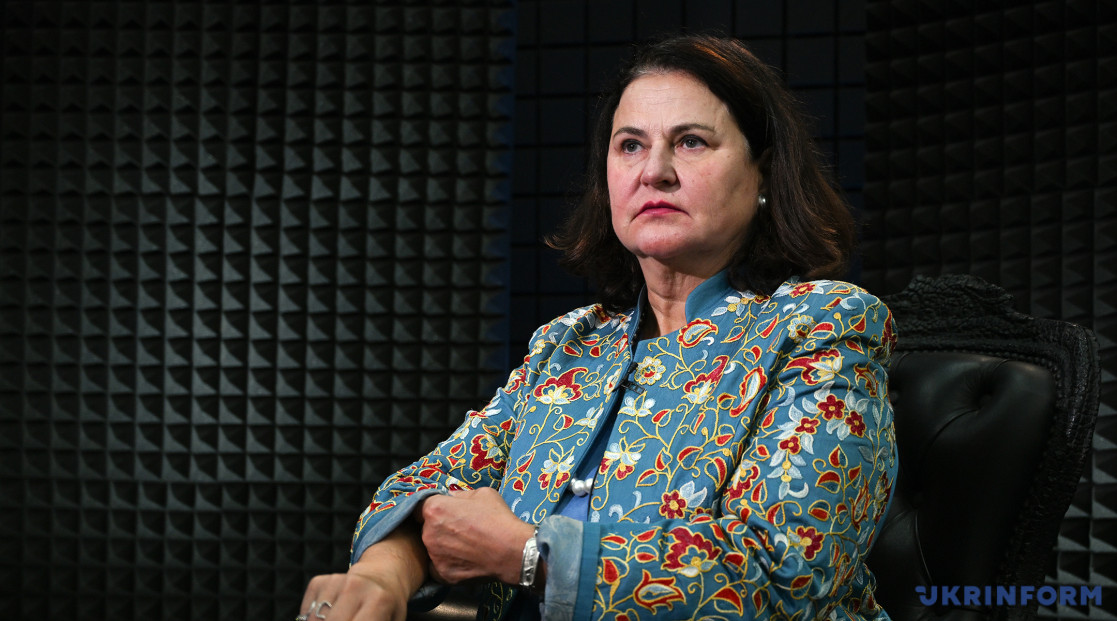
Ukrinform, 2025 (Yevhen Kotenko)
EU COMMITTED TO PROVIDE SUSTAINEBLE FINANCING TO UKRAINE FOR THE NEXT TWO YEARS
- You mentioned just now, and I heard it from many officials in Brussels, that's it's remarkable how Ukraine keeps on reforming in times of war. But we also understand that for institutional changes to be pursued, and in general to keep the state afloat in times of war, stable and predictable funding is critically needed. Can you please share the latest news on the discussions and debates going on around the idea of the reparations loan or other options of using frozen Russian assets in the interests of Ukraine – while at the same time, keeping in mind the reservations, the concerns voiced by Belgium, which holds most of those frozen assets?
- This was discussed at the summit, at the European Council in October, and indeed most of the assets that are frozen in a separate account are in Euroclear, which is an entity under Belgian law. So, the concerns of Belgium are legitimate because, should Russia come and claim the assets, they would be the first ones on the on the line. So their concerns and views were echoed before. We were all hoping that in October we would have been a little further in the process of this.
What has happened as a result is that the European Commission was tasked to come up with options for financing. There is commitment from the European Council, from European member states to provide sustainable financing for Ukraine for the next two years, so this will happen.
The question is, how much of the process we will still have to go through. The Commission is now putting the options paper together. There are only two to three potential options essentially, and one of them is indeed a loan that would be backed by frozen Russian assets.
If I were to put my money on it, I think this is the way we’ll all end up financing Ukraine. It may take still a little bit of time, but hopefully in the December European Council, at the summit, this will be decided.
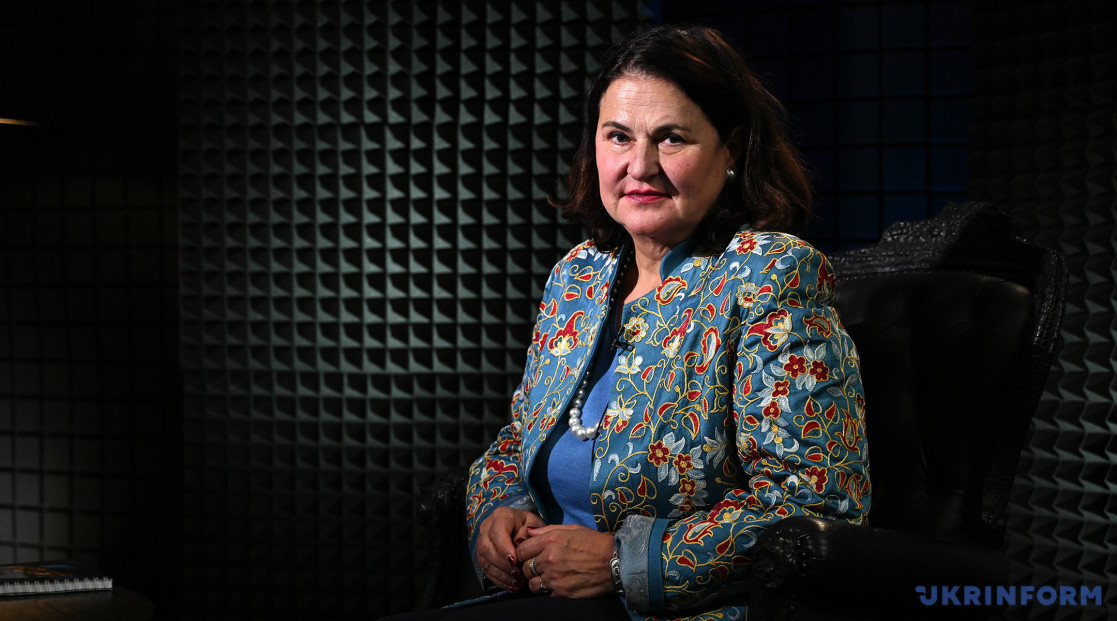
Ukrinform, 2025 (Yevhen Kotenko)
ALL PREVIOUS ENLARGEMENTS HAVE BEEN A SUCCESS – AND SO IT WILL BE WITH UKRAINE
- Another interesting topic is that, according to the Eurobarometer data, 52 percent of Europeans across the Union support the idea of Ukraine joining it. But of course, these figures vary from country to country. I remember how Prime Minister Viktor Orban even used the fact that Hungarian population is allegedly against Ukraine joining, while explaining why Hungary is blocking further accession talks. From the strategic communications perspective, what can be done by Ukraine and by the European Union to better explain to the opponents of the idea of Ukraine's accession the benefits of the enlargement?
- All enlargements in the history of the EU have been a success. And unfortunately, it's, such an obvious effect when you look at the data that often it disappears from public discourse, being replaced by various disinformation pieces as part of the hybrid warfare.
Let's not forget that Russia is very interested in spreading a lot of disinformation both ways - both here and in the European Union – about each other, and they do it in many other countries. Just look at what was happening in Moldova ahead of their successful elections earlier this fall.
There are a few points I would like to make. First, as for Ukraine's accession to the EU and what's happening before it - this is not the first time that there are fears and worries and disinformation before each round of enlargement. People on the inside, businesses on the inside, interest groups on the inside are worried about newcomers.
The French and Italian wine makers were worried about Spanish and Portuguese wines in 2004. When my country joined the EU, the so-called “Polish plumber” was the biggest scarecrow for Western Europeans and the Czech and Polish Slovak truckers were the scare of the holding industry in the west, so it's only natural when a country with this much capacity, resilience and innovative potential as Ukraine is coming that there are fears.
It's up to the leadership of each country to be explaining it to their citizens that there is nothing to worry about that. There are going to be adjustments needed, but eventually it's going for everybody's benefit.
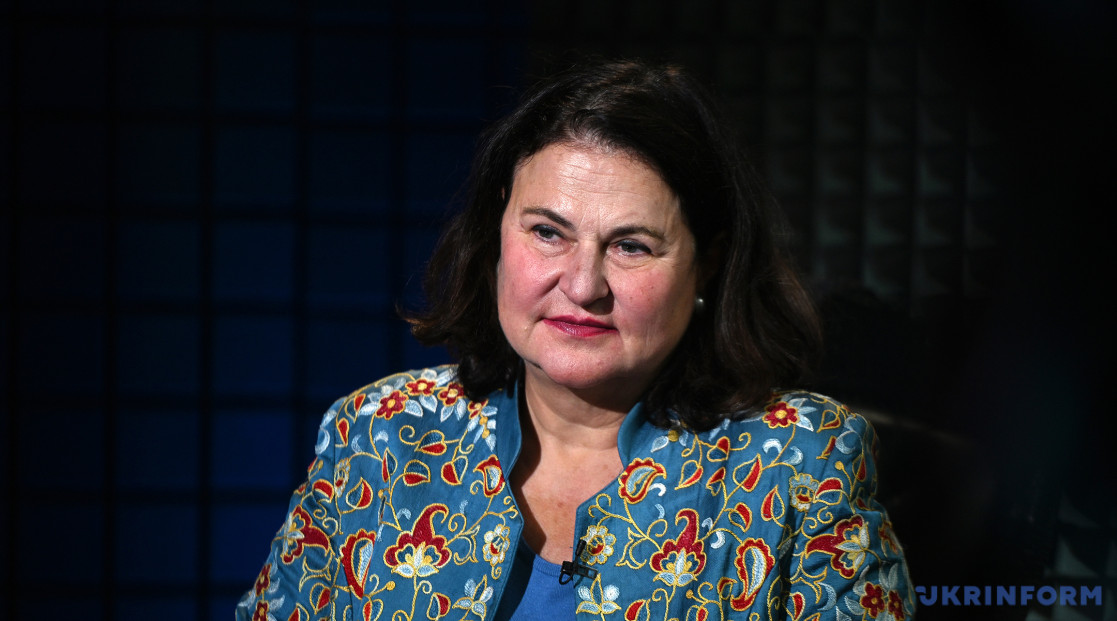
Ukrinform, 2025 (Yevhen Kotenko)
I HOPE POLITICAL AGREEMENT ON THE FORMAL OPENING OF THE CLUSTERS WILL BE REACHED IN THE NEAR FUTURE
- Some more statistics now. Some 74 percent of Ukrainians support the accession to the EU, which is a fairly high share, but there are concerns that the lack of visual progress on the track of negotiations may cause public disappointment in this whole process. The opening of clusters – the elephant in the room. We all understand that it’s a merit-based process but they're still not being opened. What are the current forecasts for the issue to be resolved, or is it better to just focus on the so-called frontloading, on reforms so that we could keep going to not let any particular leader to delay this process?
Let me start by saying that I understand the potential for public disappointment because Ukraine has done everything that was required and needed for opening the clusters, especially cluster 1, which is the fundamentals. And it has not happened for very well-known reasons so far, so I do understand the disappointment.
That's why the European Commission in its report of today very clearly and explicitly states that Ukraine is ready to negotiate in the several clusters.
But eventually, when the screening that was successfully finished at the end of October will be formally finalized, I think all six clusters Ukraine would be able to follow and negotiate.
It's stated very explicitly, and hopefully that will help allay some of the public disappointment. I think what's important is to concentrate on carrying out the reforms. Because the reforms are not done for us, for the European Union, the reforms are done for the sake of modernization of Ukraine and are important for you as a country and your citizens. I very much hope that in a foreseeable future, there will be sufficient political agreement to actually proceed formally with the opening, but we are not there yet.
THE EU IS WORKING TO MOBILIZE AS MANY RESOURCES AS POSSIBLE TO SUPPORT UKRAINE’S ENERGY SECTOR DURING THE WINTER
- As winter approaches, we see that Russia is deliberately targeting energy infrastructure, attempting to plunge Ukraine into darkness and make people freeze. I remember not so long ago I asked you about my hometown Chernihiv, when it went into full blackout, what the European Union is going to do about that. You told me that your team was already on its way to that city to assess damage and look into what can be done. And actually I didn't expect any other answer. But my question is this: as this winter promises to be difficult, has the EU found opportunities, including in third countries, to help our energy sector? And secondly, how do you assess the effectiveness of Ukraine's use of this assistance provided by the EU?
- The European Union's support for Ukrainian energy since the full-scale invasion, during war time, is a Continuum. We have spent already upwards of 3 billion euros since February 2022, and unfortunately I share with you the worry about the upcoming winter.
We do several types of interventions, several types of support. One is the financing of emergency purchase of gas. We use the Ukraine Facility guarantee cover to enable the European Bank for Reconstruction Development and European Investment Bank to together lend 800 million euros, and with the Norwegian Grant through the facilities close to a billion euros for emergency purchase of gas.
But I know that more will be needed. This is not enough. And our president von der Leyen is actively involved in discussions with other countries. She had a very good phone call yesterday with President Zelensky where also energy was discussed. So emergency purchase of gas is one area.
The other area where we are very active is the repairs. Financing and sponsoring repairs of the equipment whether it’s in state-owned enterprises or big private energy producers - to help repairs.
My favorite example of this is our civil protection mechanism, which is the transport and logistics way of bringing all the equipment to Ukraine. We actually took apart a power plant in Vilnius and transported it piece by piece to Ukraine. So there is a lot of equipment. So again, we have gas purchase, financing direct equipment deliveries, and also the emergency humanitarian support to people and communities that are affected. And last but not least, a very few days into the full-scale Invasion, we connected Ukrainian and Moldovan energy electricity grid with the continental European grid, and through that Ukraine can tap into and import I think some 2.2 gigawatts of electricity on a daily basis. That's helping certainly the western part of Ukraine to keep the keep the lights on.
But obviously, the challenges are high. And we are trying to adjust and mobilize as many resources as possible.
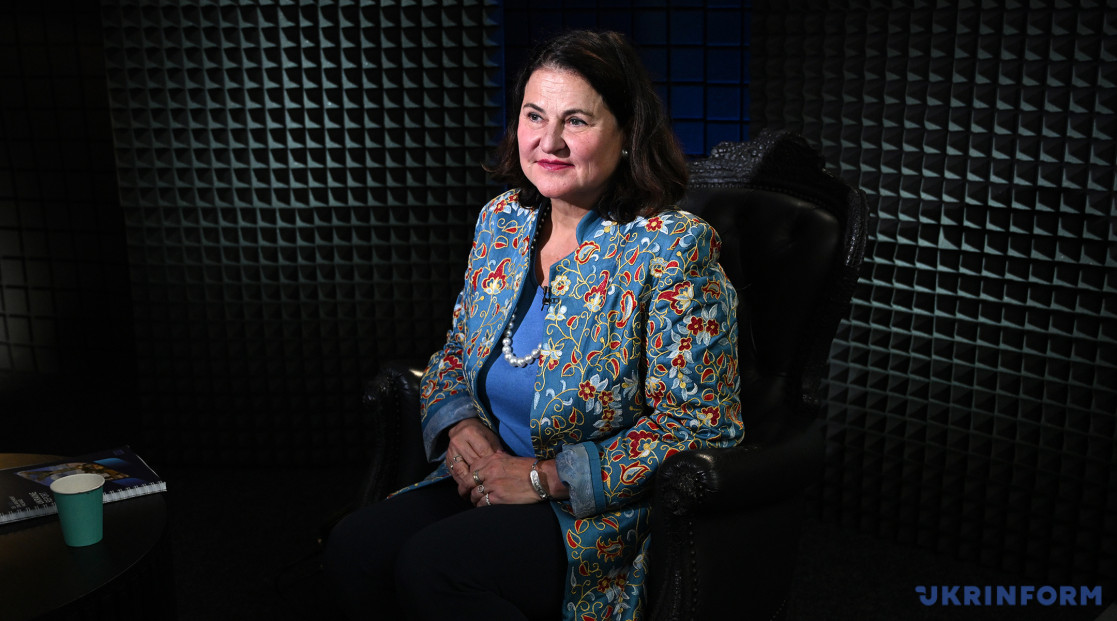
Ukrinform, 2025 (Yevhen Kotenko)
UKRAINE IS A GLOBAL LEADER IN MANY DEFENSE TECHNOLOGIES
- Another question on security. One of the areas being assessed is the compliance with the security and defense policy, and I remember Commissioner for defense and space Andrius Kubilius said that Ukraine is an important element of EU’s defense preparedness. Our important role in the SAFE loan program is also acknowledged. In your opinion, is the European Union ready to include Ukraine into its own security and defense architecture, or would it be fair to say that Ukraine is already part of that new architecture given all the geopolitical challenges arising?
I think it's very much fair to say that Ukraine is already part of it. The European defense strategy very much talks about Ukraine as part of that defense strategy going forward. And the SAFE instrument is financing for member states, but very much encouraging joint ventures and joint investments together with Ukraine.
Honestly, your defense tech is second to none. I mean, you are the world leaders on a lot of the technology and I always tell my colleagues back in Brussels that should there be a war conflict, I want Ukrainian Army having my back and not facing me.
So I think that every European should feel much calmer and safer with Ukraine in our midst.
- Now to conclude this conversation, could you, as a narrator, not as a diplomat, describe the main message of this enlargement report to Ukraine? What does it convey to Ukrainians?
- I think it conveys support, encouragement, mild warning signs, some mild concerns, and overall faith in our common future.
Ievgen Matiushenko, Kyiv
Photo credit: Yevhen Kotenko
Original is available at the link.
